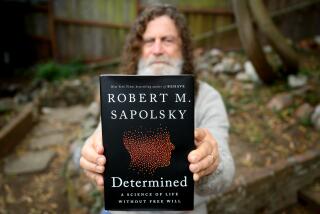Book Review : Biologist Trashes Some Gender Myths
- Share via
Myths of Gender by Anne Fausto-Sterling (Basic Books: $18.95)
Early in this cool and dispassionate book, Fausto-Sterling asks “Am I guilty from a feminist standpoint of just what I accuse others of doing from a non-feminist one?” As a genetic biologist she set out to examine venerable and cherished notions of masculinity and femininity; concentrating upon those sanctified by so-called scientific research.
Reexamining the accumulated mass of evidence purporting to prove that men and women are biologically programmed to think and behave in accordance with hormonal imperatives, the author finds the studies limited, contradictory and essentially worthless. Men should be as pleased to hear they’re not naturally violent as women will be to learn they’re not destined to be passive victims of oppression.
“Myths of Gender” is impartial, despite the acknowledged feminism of the author. Fallacious notions about both men and women topple like Central American governments, each erroneous idea about women bringing down a concomitant male myth along with it.
Fausto-Sterling is the spiritual heiress of those embattled 19th-Century crusaders for equality in education who bravely proclaimed “There’s no sex in mind .” Brave courageous souls, they had only their convictions; she has the recent research evidence. Her most dramatic and valuable chapters concentrate upon the lingering educational misapprehensions operating to keep women away from the “hard” sciences and out of such lucrative fields as engineering, sidetracking them instead into lower-paying careers in the humanities or in the “nurturant” professions.
With calm matter-of-factness characterizing the entire book, Fausto-Sterling cheerfully acknowledges the existence of physical, hormonal and emotional differences, proceeding to demonstrate that none of those qualities matters in the least when a person is thinking, learning or studying. The only sad news in this otherwise heartening book is that it needed to be written in 1985 as shoddy research continues to lend aid and comfort to the “anatomy is destiny” bloc, still using non-existent gender differences to explain, justify and perpetuate inequities.
Though “Myths of Gender” seems intended primarily for those with a solid grounding in biology, the author’s prose is entirely accessible to the average reader. Occasional moments of high comedy crop up among the charts, tables and diagrams. With a glee rare in scholarly works, Fausto-Sterling reveals that some of the most influential studies used to illuminate the behavior of men and women were performed upon species with amazingly little in common with us.
Even granting we’re all links in the great chain of being, the mating habits of the codfish and the eelpout, as observed by Prof. Robert Trivers, seem to have little connection to the ballooning American divorce rate. Trivers, however, is wonderfully informative on the origins of cuckoldry, a term derived from the female cuckoo’s tendency to lay eggs in the nests of other bird species. As the author of this book dryly comments “in modern usage, a cuckold is the husband of an unfaithful wife--a far nastier and more humiliating state, apparently, than being the wife of a philanderer, for which in fact no word exists.”
Another widely quoted scientist uses his experiments with seven species of scorpion fly as the basis for a convoluted theory of rape, while a third, writing for the influential journal Science, extrapolates extensively from his studies of sexual aggression in a colony of mallard ducks living in a “semi-natural urban environment,” stretching his discoveries to apply to courtship, seduction and forcible rape among people.
Though scientists customarily refer to such stretching as providing an “evolutionary perspective” on human behavior, Fausto-Sterling clearly finds their view excessively broad. “As exemplified by the work on rape, to take even very extensive animal research, define it according to uniquely human behavior, and then use it to analyze human behavior is both logically flawed and politically dangerous. . . . The challenge to the scientific community is to . . . undertake a new program of research which emphasizes complexity, mind-body interactions and human flexibility, an approach designed to produce a society respecting and recognizing differences while emphasizing human similarities.”
Fausto-Sterling would put the mating habits of the eelpout and the scorpion fly on the back burner while we improve math and science education for all; encouraging girls to study these subjects. Only then would we finally know if anatomy is destiny or just anatomy.
More to Read
Sign up for our Book Club newsletter
Get the latest news, events and more from the Los Angeles Times Book Club, and help us get L.A. reading and talking.
You may occasionally receive promotional content from the Los Angeles Times.






